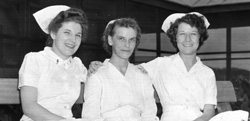CNA, LPN, RN: Who Will Best Care for My Elderly Parent?
CNA, LPN, RN: Who Will Best Care for My Elderly Parent?

(photo via Flickr)
Making the decision to hire in-home care for an elderly parent can be overwhelming. No matter how sure you are that you have made the right decision to keep your loved one at home, there are still a number of unknowns.
One of the most common questions family members grapple with is the level of care their loved one requires. Further complicating matters is the fact that there are so many options available today. These options range from certified nursing assistants (CNAs) to licensed practical nurses (LPNs) to registered nurses (RNs). In some cases, there also will be occupational or physical therapists in and out of the home.
Before you decide what level of care your loved one requires, it is important to understand the difference between a CNA, an LPN and an RN.
CNAs: CNAs usually complete an approved training course at a community college or hospital. As part of their training, students take courses that prepare them for basic nursing duties and clinical experience. CNAs are required to pass a state licensing exam.
LPNs: LPNs must complete coursework through programs recognized by the National League for Nursing Accreditation Commission. Coursework includes everything from practical nursing to pharmacology. After approximately a year of training, graduates are required to pass the National Council Licensure Exam for Practical Nurses. Working under the direction of physicians and registered nurses, licensed practical nurses can perform most nursing duties.
RNs: In most states, RN students attend a college or university to earn a two-year associate’s degree in nursing or a four-year bachelor degree in nursing. Once they earn their degree, they must sit for the National Council Licensure Exam for Registered Nurses. RNs perform all regular nursing duties and have more training and responsibility than CNAs and LPNs.
One way to alleviate anxiety regarding the care your loved one requires is to hire a reputable home health care agency. This agency will work with you, your loved one and your loved one’s physician to assess his or her specific needs. It is at this point that a decision will be made as to what type of caregiver your loved one requires.
If a patient only needs assistance with daily activities such as preparing meals or transportation, a CNA would likely be assigned. Patients who require more skilled services such as dressing changes, wound care or medication set up would require the care of an LPN. Finally, individuals on respirators, those recovering from surgery or suffering from major cardiac or pulmonary problems would be assigned an RN. In some cases, a patient might begin with an RN until they have recovered from surgery, for example, and then be assigned an LPN as his or her condition improves.
Equally as important as a caregiver’s credentials is how comfortable you and your loved one are with that caregiver. While it is essential that a caregiver is able to provide the proper medical attention, it is equally important that the patient and caregiver hit it off. After all, they will be spending a great deal of time together. If there are any specific qualities you are looking for in a caregiver, make sure to let your home health care provider know.
You also should expect your home health care agency to carefully assess your loved one’s unique needs before coming up with a plan of care. This plan will include things like what type of medical care is needed, specific details of a caregiver’s duties and responsibilities, and the hours he or she will spend in the home. Once a plan has been devised, you may want to have it reviewed by the patient’s doctor.
Finally, it is important to talk with your loved one on a regular basis to find out how he or she is doing. If there are any issues or concerns, you can then work with your home health care agency to make the necessary adjustments.
